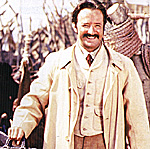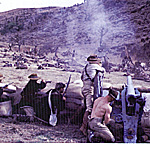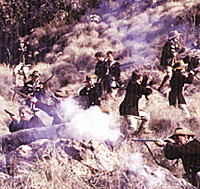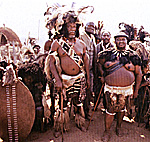 The epic series Rhodes, currently being screened on the BBC, is an exciting variation on an old theme; a rip-roaring adventure story in the Boy's Own mode, but with an intelligent script, and a very modern awareness of the ambiguities and cost of colonial adventures.
The epic series Rhodes, currently being screened on the BBC, is an exciting variation on an old theme; a rip-roaring adventure story in the Boy's Own mode, but with an intelligent script, and a very modern awareness of the ambiguities and cost of colonial adventures.
Cecil Rhodes was one of the great heroes of the Victorian empire. The younger son of a village parson, he went to South Africa in the 1870s' because of his poor health. Here he gravitated towards the diamond mines at Kimberley, then a roistering boom-town. After a brief spell of working the mines, Rhodes became a speculator, buying up his rivals' properties until he controlled most of the diggings.
Using this immense personal wealth, Rhodes worke to bring about a personal vision of Africa, in which British interests controlled a corridor of land all the way from the Cape to Cairo. This led to Rhodes involvement with the Ndebele (Matabele) kingdom, in what is now Zimbabwe. Rhodes was convinced that Zimbabwe held mineral riches to rival those of Kimberley and the Witwatersrand, and he schemed to obtain them. In 1890, his British South Africa Company - basically his private army - obtained concessionfrom the Ndebele king, Lobengula kaMzilikazi, to occupy and prospect Mashonaland - part of the Ndebele kingdom. When Mashonaland proved to hold no great wealth, however, Rhodes e ngineered a conflict with Lobengula, and in 1893 the Ndebele were defeated. For eighty years Zimbabwe was known as Rhodesia after Rhodes.
The conquest of Matabeleland was only part of Rhodes' goal however, which came increasingly to focus on overturning the Boer republican government in the Transvaal. The Transvaal, under Paul Krueger, was suspicious of foreigners, and obstructive of mining magnates like Rhodes. Rhodes planned an armed coup, in which foreign differs in Johannesburg, called uitlanders, were to rise up and overthrow Krueger, supported by armed intervention by troops raised by Rhodes.
This was the famous Jamison Raid of 1896/7, which proved a fiasco. The uitlanders did not rise, and Jamison was easily defeated at the Battle of Doornkop. Taking advantage of the absense of Company troops, the Ndebele and Masona both rebelled.
After months of indecisiove fighting, Rhodes himself went into the Ndebele strongholds to negotiate peace. By now the scandal of the Jameson Raid had badly damaged his reputation, however, and when the Boer War proper broke out two years later, Rhodes was in Kimberley when the Boers besieged it. He spent his time quarrelling with the military commander, Colonel Kekewich, and trying to undermine his authority. After the siege, Rhodes' health collapsed and he died. He chose to be hurled in the heart of Rhodesia, where, ironically, the Ndebele gave him a royal funeral.
High Drama
 Rhodes' life is certainly the stuff of high drama, yet in many ways it was a difficult subject to bring to the screen. For one thing, although Rhodes had an undeniably charismatic personality, he wasn't, in many ways, a nice man; he was powerful, ruthless and corrupt. Even
his over-riding belief in the British Empire, which made him seem great at the time, seems less than attractive in an age when empires are no longer fashionable. Furthermore, the story really needed to be told in the grand scale, and in Africa, and as such was always likely to be
both expensive and to do it justice, long.
Rhodes' life is certainly the stuff of high drama, yet in many ways it was a difficult subject to bring to the screen. For one thing, although Rhodes had an undeniably charismatic personality, he wasn't, in many ways, a nice man; he was powerful, ruthless and corrupt. Even
his over-riding belief in the British Empire, which made him seem great at the time, seems less than attractive in an age when empires are no longer fashionable. Furthermore, the story really needed to be told in the grand scale, and in Africa, and as such was always likely to be
both expensive and to do it justice, long.
The series made by Zenith Films for the BBC weighs in at nearly nine and half hours, and cost a total of ten million pounds. It was shot over an eighteen month period in South Africa something which has only been possible since the free elections in that country.
The project received the support of the ANC government, who realised that it was taking a searching look at the origins of black exploitation and white rule in South Africa. The series benefits from location shooting. Most was shot in open veld near Johannesburg, where not only the entire boom-rush town of Kimberly was recreated, but also the Ndebele capital, Gubulawayo.
The character of Rhodes is clearly central to the plot. He is played by Martin Shaw, and as a young man by Martin's son, Joe Shaw. Joe brings a fresh-faced charm reminescent of Hugh Grant, while Martin portrays the adult Rhodes as deeply cynical. Indeed, on a human level, the series has elements of classical tragedy, as Rhodes is depicted as an extremely dynamic man who is corrupted by power. Much has been made in the press of the series' suggestion that Rhodes W8S a repressed homosexual; he quite probably was -- he was known to dislike women, and surrounded himself by handsome young men - but since, as Martin Shaw has pointed out, Rhodes would have scarcely have recognised this description of himself, and would probably have been horrified at the thought of expressing his sexuality, this is something of a red herring.
The series certainly explores the ambiguity of the character of both Rhodes and his lieutenant, Dr. Leandar Starr Jameson, however, played by Drop The Dead Donkey and Between The Lines star Neil Pearson. Both men believed utterly that what they were doing was right, and would hold firm the long term good of even their victims, yet both were prepared to go monstrous lengths to achieve their aims. Rhodes persuaded Jameson to cover up an outbreak of disease in the diamond diggings, while Jameson abused his medical training by giving King Lobengula morphine to treat his gout. He knew the king would become addicted, and unable to resist Jameson's demands. Rhodes was quite prepared to destroy both the Ndebele Kingdom, and the Transvaal republic, in pursuit of his vision of empire. The Ndebele, indeed, emerge as a tragic people from the series, bulied, harried, and driven to war by Rhodes, then persuaded to lay down their arms, only to be betrayed by peace.
 For once, the series does not shy away from epic scenes, and there is a lot of military activity, particularly in the last third, which features a number of skirmishes with the Ndebele, a full-scale attack on a Company wagon-laager, the burning of Gubulawayo, the Jamison
Raid, and fighting on the outskirts of Kimberly.
For once, the series does not shy away from epic scenes, and there is a lot of military activity, particularly in the last third, which features a number of skirmishes with the Ndebele, a full-scale attack on a Company wagon-laager, the burning of Gubulawayo, the Jamison
Raid, and fighting on the outskirts of Kimberly.
It is good to see the Ndebele War recretaed with such verve, since it has largely been ignored by filmmakers in th epast, with the exception of the 1930s white wash biopic, Rhodes of Africa, and the obscure 1970s South Africa film, Shangani Patrol.
 On the whole, military details are pretty good. Rhodes' private army has a suitably filibustering look, while some attempt has gone into showing the Boer War scenes accurately. There are a few slips, but these are mostly in incidental uniforms, and it would be a pity to spoil one's enjoyment. The Ndebele look splendid. They were played by Zulus (the Ndebele were a break-away section of the Zulu state), who bring the necessary warrior spirit to the role. The
characteristic Ndebele warrior costume - black ostrich feather headdress and capes are well done, though there are a few fanciful touches here and there. Nevertheless, this is probably inevitable in a series of such scope and overall, Zenith should be congratulated on
bringing a story of such scope onto the small screen.
On the whole, military details are pretty good. Rhodes' private army has a suitably filibustering look, while some attempt has gone into showing the Boer War scenes accurately. There are a few slips, but these are mostly in incidental uniforms, and it would be a pity to spoil one's enjoyment. The Ndebele look splendid. They were played by Zulus (the Ndebele were a break-away section of the Zulu state), who bring the necessary warrior spirit to the role. The
characteristic Ndebele warrior costume - black ostrich feather headdress and capes are well done, though there are a few fanciful touches here and there. Nevertheless, this is probably inevitable in a series of such scope and overall, Zenith should be congratulated on
bringing a story of such scope onto the small screen.
Back to Colonial Conquest Issue 12 Table of Contents
Back to Colonial Conquest List of Issues
Back to MagWeb Master List of Magazines
© Copyright 1996 by Partizan Press.
This article appears in MagWeb (Magazine Web) on the Internet World Wide Web.
Other military history articles and gaming articles are available at http://www.magweb.com